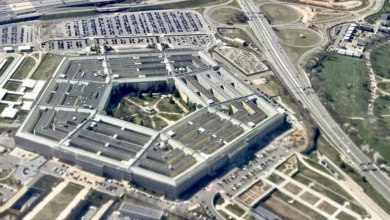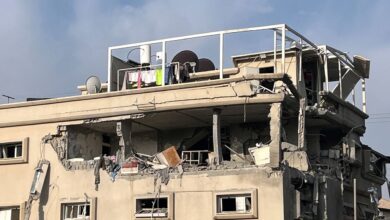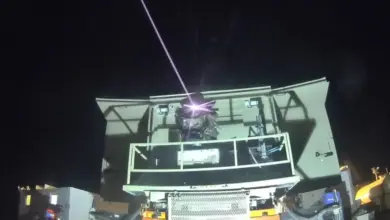A year has elapsed since the onset of the Syrian revolution against the regime of Bashar al-Assad. The ruthlessness by which the Assad regime has addressed this revolution attests to its refusal to seriously reform or to even contemplate a peaceful transitions of power similar to the Yemeni situation.
Amid all this ruthless carnage all across Syria, the real question remains as to what will be the ramifications of these events on the region in general but, more specifically, on the Lebanese political scene.
The Syrian military presence in Lebanon, which lasted since 1976, was brought to an end in 2005 following the assassination of former Prime Minister Rafik al-Hariri. But despite its rapid eviction, Syria continued to wield considerable political influence through its traditional allies but more so through Iran’s proxy, Hizbullah. Many observers, including United Nations Secretary General Ban Ki-moon, have voiced their fears that the worsening crisis in Syria will have a negative impact on Lebanon, specifically a possible eruption of security-related clashes. The most recent of these events was a gun battle that broke out on the streets of Tripoli, Lebanon's second-biggest northern city, last month between the anti-Syrian Sunni faction of Bab al-Tebbaneh and the pro-Assad Alawites of Jabal Mohsen. Walid al-Mouallam, Syria’s foreign minister, had previously accused Islamic militants from Tripoli of infiltrating Syria and taking up arms alongside Sunni fundamentalist elements. The Lebanese government, currently headed by Prime Minister Najib Mikati — an ally of Assad — has, however, implicitly supported the Assad regime while publicly disassociating itself from the ongoing conflict. The sentiment of the street vis-a-vis the Syrian conflict, however, is another matter.
The Lebanese public at large is sharply split over the Syrian revolution. This divide reflects the ongoing political crisis, which has dominated Lebanon since Hariri’s assassination, splitting the country into two camps. On one side, there is the 14 March anti-Syrian coalition, and on the other the 8 March pro-Syrian camp, headed by Hizbullah. To some observers, this faceoff is merely a continuation of the fragmentation in Lebanese politics, and the events of the Syrian revolution will not drastically change the Lebanese political landscape. However, the events of the Syrian revolution will categorically influence the status of Hizbullah, Assad’s trans-regional ally.
Following the exodus of the Syrian forces in 2005, Hizbullah stepped forth to fill the gap created by Syria’s diminishing influence on Lebanon. This was especially true after Hizbullah held sway following its so-called divine victory following the 2006 Israeli war on Lebanon. Accordingly, Hizbullah became the poster child of the so-called Syrian-Iranian project and represented the growing Iranian influence in the region.
Sayyed Hassan Nasrallah, Hizbullah secretary general, unequivocally voiced his support of the Syrian regime’s ongoing crackdown against the rebels. He perceived the Syrian uprising as being merely part of a Western-hatched plan (aided by the anti-Syrian 14 March coalition) to defeat the forces of resistance in the region. Interestingly, however, this same position was not shared by Hamas, which, despite its anti-Western rhetoric, preferred to side with the Syrian people rather than the regime.
While Hizbullah’s position is somewhat understandable from a logistical and a political perspective, one needs to wonder about the ramifications of the eventual collapse of the Syrian regime on Hizbullah’s status in Lebanon and the region.
Many analysts assert that the downfall of the Assad regime, Hizbullah’s principal weapons facilitator and political ally, would corner the party domestically and force them into relinquishing their sizeable military arsenal. It is worth noting that Hizbullah has declared it would meet any attempts to demilitarize it with brutal force.
Walid Joumblatt, Druze chieftain and leader of the Progressive Socialist Party, has urged Hizbullah on numerous occasions to refrain from backing the Assad regime but more importantly to “recognize the sensitivity of the internal and sectarian situation in Syria.” Joumblatt has further implied that Hizbullah should not fear any domestic challenge pertaining to its arms and that the events of the Syrian revolution should not be used domestically by any side to force their own political agenda. For Joumblatt, the main challenge is to prevent the Sunni-Shia schism from spilling over into the streets of Beirut, while at the same time convincing his current allies, Hizbullah, to refrain from supporting and partaking in the killing of the Syrian people.
In order to mend the sectarian rift in Lebanon (that leaves Hizbullah dependent on Syria and Iran), Joumblatt proposed a renegotiation of the Taif Agreement in order to give Shias a real stake in the Lebanese system. While this settlement as proposed by Joumblatt might be theoretically sound, the reality of the matter is different.
The Taif accord, hatched in 1989, was part of an international and Arab consensus to end the civil war in Lebanon. Reenacting such a consensus policy is not feasible today, especially with the Arab League’s antagonistic position toward Assad and his allies, in this case Iran. Second and more importantly, Joumblatt’s proposal assumes that Hizbullah would contemplate the idea of disarming or “incorporating” into the Lebanese army, as part of a strategic military master plan.
The bleak reality remains that as long as violence is the order of the day in Syria, the Lebanese Sunnis and their allies would continue to feel that their Shia compatriots, headed by Hizbullah are partners in this crime. And despite constant reassurances by Hizbullah that the party will exercise political refrain and be wise in honoring its domestic pledge not let the Syrian predicament damage Lebanon, the real question remains whether this entails that Iran and Hizbullah will jump ship and stop backing Assad, when the time is right, or will they refrain from doing so and thus take Lebanon with them into the realm of the unknown?
Makram Rabah is a PhD candidate at Georgetown University's history department. Rabah is the author of "A Campus at War: Student Politics at the American University of Beirut 1967-1975."




